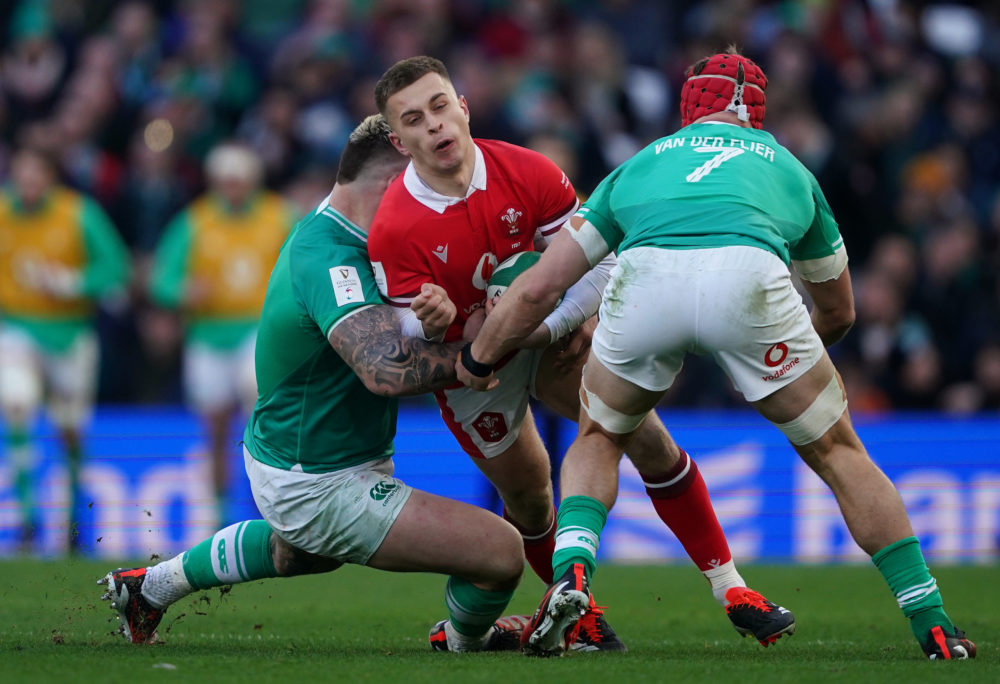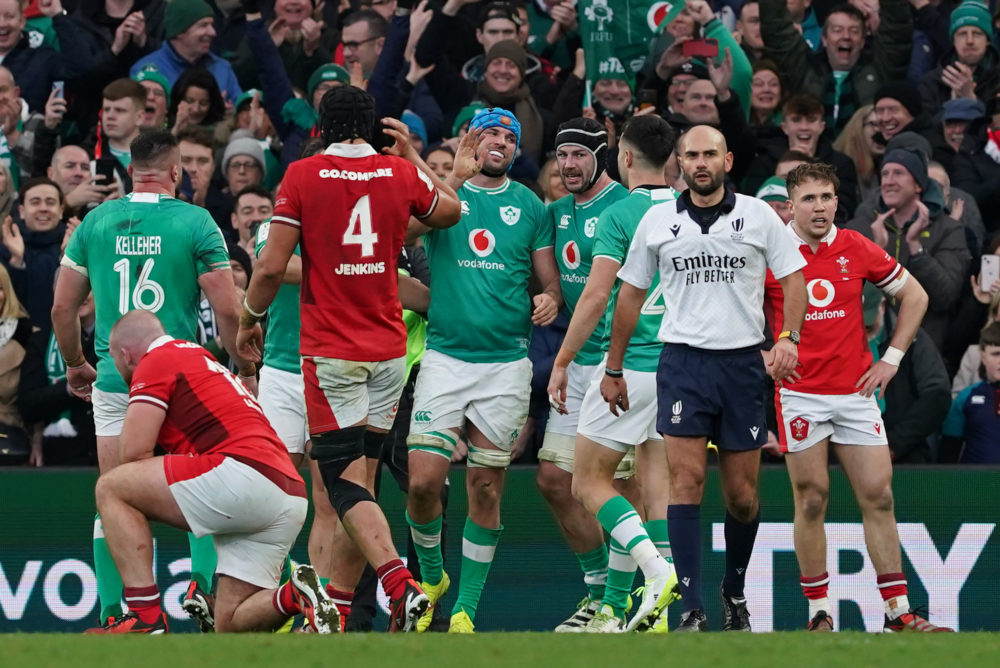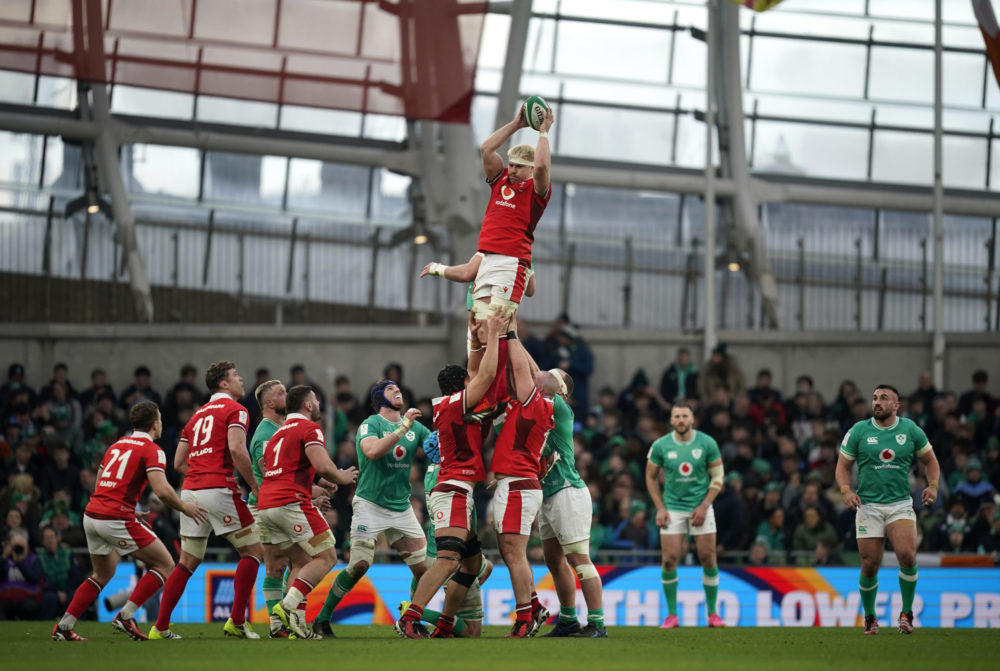Defeat against Ireland was another tale of two halves for brave Wales

Simon Thomas
Another 40 minute performance, another tale of missed opportunities and another set of tough lessons learned.
There’s certainly something of a theme developing when it comes to Wales’ Six Nations campaign.
Now, in fairness, you can’t question the heart and effort this young team is showing.
That was evident again out in Dublin from the way they responded to a torrid first half, just as they had done against Scotland.
In general, they are giving it everything and trying their level best both with and without the ball.
But, unfortunately, there just isn’t the end product to go with that endeavour at the moment.
As has been the case throughout their Championship season so far, it was very much a tale of two halves at the Aviva Stadium.
The first 40 minutes reminded me of one of my favourite lines from the great Bobby Windsor.
Following Wales’ defeat to France in Paris back in 1977, he was asked what he had learned from the experience.
“I’ve learned to bring my own ball next time I come here. They don’t let you play with theirs!” replied the great Pontypool hooker.
It was a similar story during yesterday’s first half, with Wales barely getting a sniff.
Possession
Ireland monopolised possession 70-30, while their territorial grip wasn’t far behind at 62 per cent.
Much of that was down to their dominance at the scrum where Andrew Porter’s singular style on the loosehead was proving highly effective, with the retreating Welsh pack being pinged for a series of offences.
Ireland were also on top at the breakdown, which further contributed to them winning nine penalties in total during the half.
It all meant Wales had virtually no ball to play with and spent pretty much the entire half on the back foot and under the cosh.
Tellingly, it was 36 minutes before they finally got into the opposition 22 and that short period of pressure came to nothing due to a knock on and going off feet at a ruck.
That failure to turn opportunity into points was to prove a portent of what was to come.
Tries from hooker Dan Sheehan and wing James Lowe made it 17-0 to Ireland at the break and the deficit would have been more but for some desperate scramble defence.
Such had been the hosts’ superiority, you feared what the second half might bring.
As Ireland legend Brian O’Driscoll said after the game: “That had the potential to be a horror show”.
Spirit
But what this fresh-faced Welsh team does possess is fight and spirit and that was shown by the way they came out for the second period.
Their fast start was swiftly rewarded with a penalty try, which also saw Tadhg Beirne yellow carded for changing his bind as a maul drive headed for the whitewash.
At 17-7 and 14 v 15, the game suddenly had quite a different complexion.
It also began to become pretty unstructured, amid the kind of chaotic rugby which Rob Howley had said Wales were aiming for pre-match.
But creating chaos is one thing, you’ve got to have a clinical edge to go with it and that’s what was missing.
Ultimately, the biggest difference between the two sides was their respective efficiency in the opposition 22.
Wales were now getting ball, with their scrum solidifying amid changes of personnel, while they were also winning penalties.
Possession
But having possession can sometimes be a bit of a double-edged sword as it can show up your attacking limitations and that was to prove the case with Warren Gatland’s men.
You can look at a series of key passages of play to illustrate the point.
On 51 minutes, with a man advantage, they had piggy-backed their way up to the 22 via two penalties and gone for a front of the lineout ploy.
From that platform, it became apparent the pick-and-go was to be the preferred method of attack. We were to see a lot of it.
A further Irish offence enabled Wales to kick to the corner and here was the big chance. Another try off a lineout drive and it could be 17-14 and very much game on.
But, crucially, Beirne returned from the sin-bin just before the throw-in and this time the former Scarlets lock managed to spoil the maul legally, getting his mitts on the ball and stealing possession.
However, Wales were to have another big opportunity just a minute later.
They worked themselves back into the Irish 22 and once again it was the pick-and-go they opted for.
For some two minutes and 19 phases, they huffed and puffed away, but they just weren’t able to cross the gain line, first going from side to side and then backwards.

You could see the ruck ball getting progressively slower and the ideas running out. In the end, hooker Elliot Dee became isolated as he attempted to make ground and his opposite number Ronan Kelleher swooped to win the relieving jackal penalty.
It was the key period of the game and the chance had gone.
Pounded away
While Wales pounded away for phase after phase with no joy, the hosts were able to make comparatively effortless progress up the field and proceeded to show just how to turn pressure into points, as full-back Ciaran Frawley marked his first Test start by picking a nice line against a stretched defence to make the victory safe.
The visitors had a further opportunity to get some consolatory points on the board in the closing stages as they went through two more minutes of attacking in the opposition 22.
Once more, it was the unswerving pick-and-go approach and it did seem as though the hammering away had finally worked with the tireless Aaron Wainwright appearing to get the ball down on the try line.
But by the time referee Andrea Piardi came round the corner, the ball had moved back a couple of inches and he declared it to be short. Such are the narrow margins.
There was to be one last chance when Irish second row James Ryan was yellow carded as the offences mounted.
Could Wales capitalise on their extra man and maybe vary things a little to get some belated reward for their efforts?
Sadly no, as they stuck with the same forward carrying only to be held up over the line.
There was just time for Ireland to rub more salt in the wounds by once again showing how it should be done as they rapidly made ground and then delivered the incisive finish from that man Beirne.
Cruel
It made for a final scoreline that was somewhat cruel on Wales given the balance of play after the break.
But those are the harsh realities of international rugby.
The message is clear. They have to add more strings to their attacking bow and find different ways of breaching well-organised defences because they simply don’t have the size or power to adopt a battering ram approach. One-up carrying is not going to cut it.
The match stats tell the tale.
Ireland made 12 clean breaks, while Wales produced just one, while the hosts also comfortably took the offload count 10-3, showing they have dexterity to go with their carrying clout, a double whammy their opponents couldn’t replicate.
In addition to addressing a blunt attack, Gatland’s other big challenge is to somehow orchestrate an 80 minute performance because it’s been half measures so far and that has resulted in three defeats.
On the individual front, it was the same players that really stood out as in the first two games.
The tigerish Tommy Refell made more tackles (21) than anyone else on the pitch, while skipper Daf Jenkins put in 17 amid another big shift.

No 8 Wainwright once again stood out and not just for his blonde barnet, leading the way on the carrying front (14) and winning a stream of lineout ball, while also producing a stirring kick and chase after a spot of juggling cover.
But the pick of the bunch was Cam Winnett.
It’s hard to believe he had made just three starts for Cardiff before this season, such is the way he has taken to international rugby like a duck to water.
He had impressed in his first two outings against Scotland and England, but now he stepped up to another level again.
The 21-year-old was a constant threat with his counter-attacking, running for 107 metres, the most by any player from either side.
His side-step to beat James Lowe early in the second half was one of the moments of the match, while it was his dummy and breaking of Jack Crowley’s tackle that took Wales into the 22 for their final onslaught.
On top of his attacking excellence, he was rock solid under the high ball, while not even a cut above his eye could deter him as he carried on bandaged up, bloodied but unbowed.
Cardiff coach Matt Sherratt said a few weeks back that Winnett has barely put a foot wrong all season and that continues to be the case.
The young full-back is a class act and he is here to stay.
Lung-busting
One further footnote on the game. The ball-in-play time was 44 minutes and 21 seconds, compared to an average of 34 minutes and 18 seconds at the World Cup. One second half passage lasted a lung-busting seven minutes and six seconds. It’s fair to say there would have been some pretty tired bodies in Dublin last night!
As for the pundits’ views on the contest, Jamie Roberts summed things up succinctly, speaking on ITV.
“I think Wales performed really well in that second half, from where they were at the break,” said the former Test centre.
“They kept the ball far better and applied pressure.
“But the game is won and lost in the 22s now. When you get entries, it’s how can you convert them into tries.
“Wales created opportunities, but they had to be more accurate.
“You contrast Ireland’s efficiency when they get into the 22 to Wales’.
“The Irish just keep on coming, they are relentless, with players coming onto the ball with momentum, while Wales had one-up runners that was quite easy to defend.
“I would love to see Wales have a bit more variety in the opposition 22. When you come up against really world class defences like Ireland, you can’t just pick-and-go and hope to go over the line.
“You saw Frawley’s line for his try. You’d like to see Welsh backs offering themselves, offering more variety challenging that defence, Nick Tompkins and George North picking lines off 9. I think Wales need to do that in their last two games.”
Roberts added: “Ireland were the classic example of a counter-punch team, absorb pressure, absorb pressure, absorb pressure. Then they know after Wales have been through 20 phases and turned the ball over, that’s when they are at their most vulnerable. They are tired, so you have to go for the jugular.”
Next up for Wales now is a meeting with the French in Cardiff on Sunday, March 10.
Finishing on an upbeat note, Roberts said: “I think they can beat France. They have shown enough across the first three games, but it’s about an 80 minute performance.”
We shall see in two weeks’ time.
Support our Nation today
For the price of a cup of coffee a month you can help us create an independent, not-for-profit, national news service for the people of Wales, by the people of Wales.





We were rubbish, stop sugar coating the problems, otherwise they will always have excuses why they are so bad and will not grow.
Wales do have some new promising new players that featured yesterday in Dublin. Not to wallpaper over the cracks. And they are gaping, I might add. But again Wales were failed regarding a possible 2nd try scored by Wainwright missed by the ref, officials and TMO. Why? At that point Ireland were wobbling , Wales were on top, and a try would have meant we were just 3 points behind with a converted try being 14 – 17. And not putting the whole blame totally on the match officials. Why wasn’t our captain more vocal and pressed the ref to… Read more »
The article is rather optimistic..Ireland brushed us aside for a lot of the game. Never seen our scrum going backwards like that. We did better at the line outs. At least they didn’t give up. Hope for better things against France.
Thought Wales were going to struggle from match 1, you get a feel for it. No point saying we could have had it if this happened or that happened, the ref missed it, what did happen is Wales lost cos they are out played. Talent is there, just does not feel a a gelled team to me.
Fingers crossed though the gelling is about to happen. Like Scotland 2nd Half.